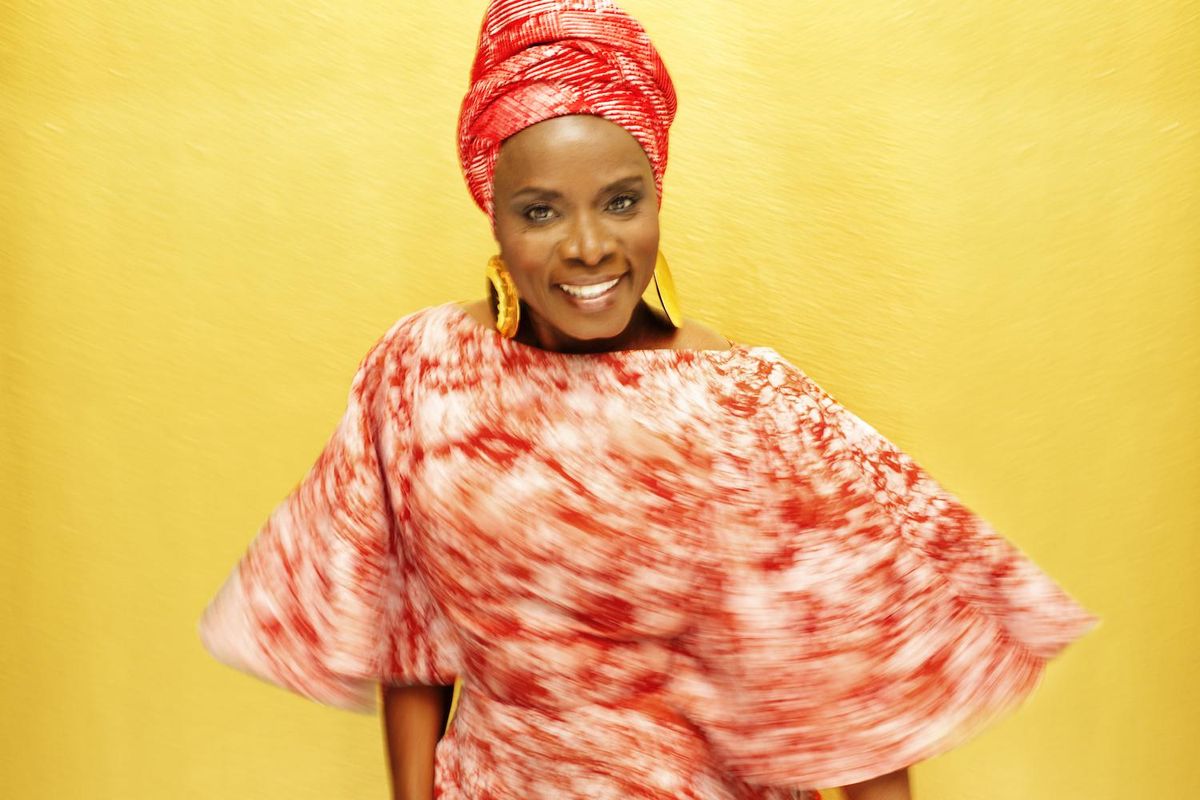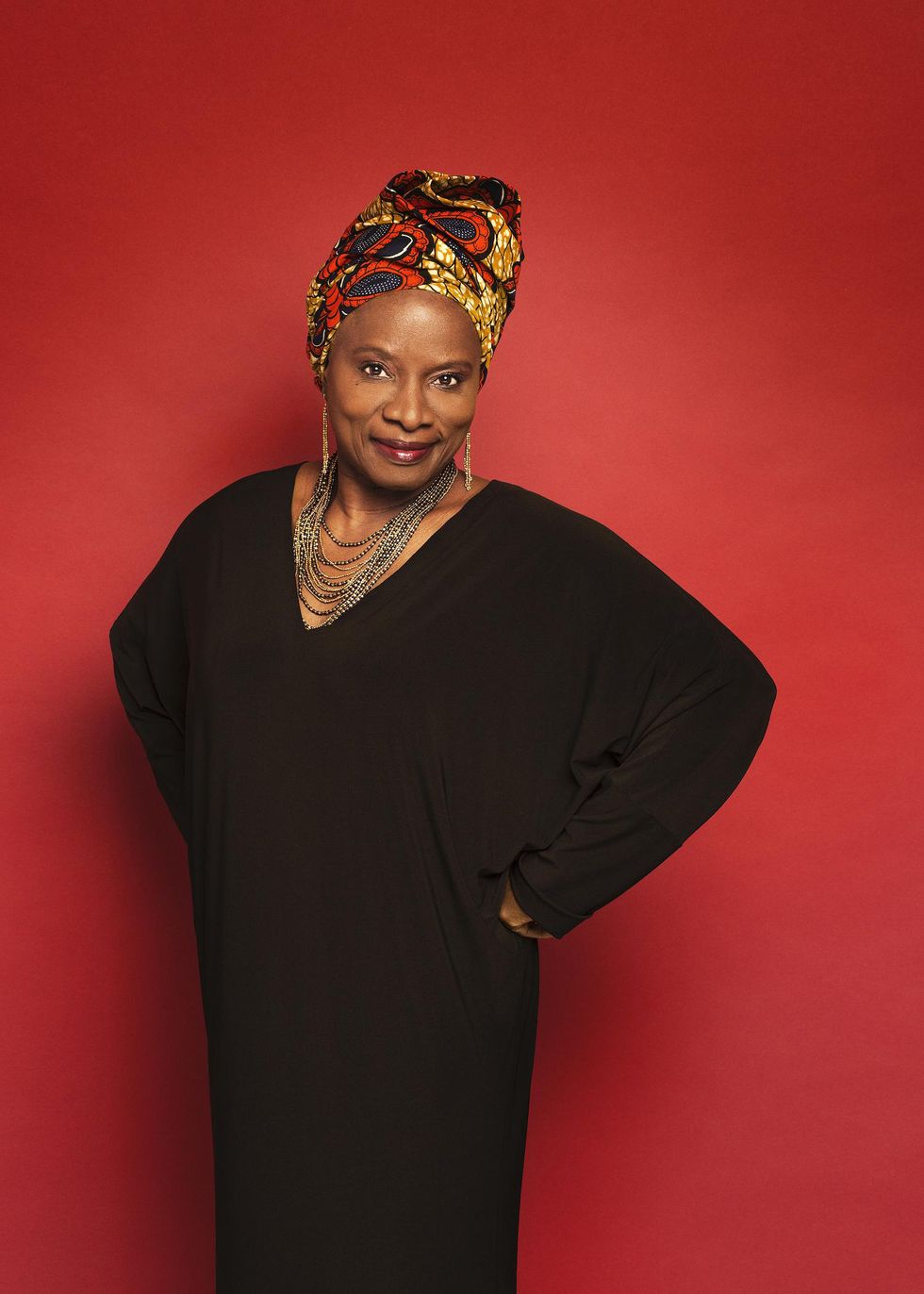Angelique Kidjo Writes a Love Letter to 'Mother Nature'
We talk to the Beninese musical icon about assembling her new album on Zoom and the "bigger than COVID-19" threat that lies ahead!

The kind of infectious energy that lives within Angelique Kidjo can't be contained by Zoom. Her zest for life reaches out far beyond any screen, and burns stronger than the fastest internet connection.
"I can't wait until we're in person hugging again," she enthuses soon after joining our Zoom meeting to discuss her latest album Mother Nature. Having been on the receiving end of a hug from the four-time Grammy-winning singer, I know exactly what I'm missing out on. "Me too," I say, as I wrap my arms around my laptop, my face squishing the screen. "No, no," she retorts. "I don't want that. You keep it. I want the real deal," she chuckles, her full-bodied trademark laughter lovingly admonishing me.
The Benin-born musician is preparing to release Mother Nature, a collection of songs reflecting our one Earth, and cementing her status as an African musical icon. Collaborating with the likes of Yemi Alade, Mr Eazi, Burna Boy, Sampa the Great, Shungudzo and more, Kidjo's crossing through time and space, over age and country through Mother Nature's themes and stories. Each track is infused with a vigor that only she possesses — the kind that shares a significant message even as the listener is called to just dance or sing along.
Below, Angelique Kidjo reminisces about making the album, and chats us through her hopes and dreams for it!
Mother Nature, your new album title, comes from a very important place and point of view for you. What is that?
Oh, yeah! Where would we be if there was no nature? Where would you be sitting? Would you have a home or a roof over your head? Would you be able to breathe? For me, Mother Nature is a breathing being, like us, and we are just stifling her. If I can't breathe, you can't breathe, and she cannot breathe.
Angelique Kidjo - Africa, One Of A Kind (Clip Officiel) ft. Mr Eazi, Salif Keitayoutu.be
I imagine through touring around the world, you've seen the impact that mankind has had on the world?
I've seen it so much more than anybody else. What's really worrisome is the recurrent drought in Africa. If we're not able to feed ourselves, then we're in trouble. This pandemic is nothing compared to what that will do to us. We, African countries, are going to pay the bigger price of this climate change that we're facing, and we are not even the ones polluting the most. So, how do we talk about this without fighting one another? How do we come to a consensus? In the same way that we pray for a child before they go in for a cancer surgery,. we have to gather and love Mother Nature — and do everything for her cancer to disappear.
"We, African countries, are going to pay the bigger price of this climate change that we're facing, and we are not even the ones polluting the most."
That's been one of your greatest gifts...Over the years, through your music, you've been able to share messages and thoughts. What was your starting point for this album? How did you assemble all the featured artists?
I've done two cover albums that allowed me to go back and see the richness of Africa's culture. It has allowed a group like the Talking Heads to do the album Remain In Light; it has allowed Celia Cruz to embody and to accept her own 'Africanity.' And nobody but ourselves see the beauty of our continent. But we have examples where people have been impacted and empowered by the cultures of the continent. It became obvious to me that, in order for our cultures to survive, our nature has to survive. In order for the next generation to have a say, and to be the agents of change that they want to be, we need to come together and really write this love letter to Mother Earth. That's the starting point for me, period.
I never do any music where Africa isn't the basis. I might not know where I'm going, but I definitely know where I come from and belong. So throughout the years, in all my career, I never realized the impact that my music has had on young girls and boys in Africa until I became a UNICEF Goodwill Ambassador and started traveling. I went to places where they didn't even call me by my name, but by my songs.

That's when I realized that I had really given this young generation, that we see today, the pride of standing up for themselves. I always say, 'Talk is cheap, action is expensive.' And I love to talk and explain, but I also want to prove things. So, that's how the whole album started. I have been fortunate, time-wise, to be grounded, even though it was during a pandemic. I made the best of my time by creating this album, and doing it in a way that minimized the carbon footprint.
You connect with a lot of artists of a younger generation, like Burna Boy and Mr Eazi, on this album in an effortless way.
The transmission is always there. Our ancestors have always been an example of transmission. That allows us to be who we are, and even if we don't think about it every day, it's embedded in our DNA. So we just carry that around. We don't think about it. But when we need it, that transmission comes back within a click. When you're telling your story to somebody, and the person is telling you their history, you are in fact exchanging transmissions. That's how our humanity has survived over Centuries.
It was really important to create this chain of transmission with this young generation of musicians who grew up with my music. It was mostly for them to understand that someday, when I'm no more, they can continue doing the same. They can continue with the transmission and pass it on to their kids. We need our stories to be told. No one will tell our stories better than us. If you don't tell your story, people will own your narrative and your identity.
"I never do any music where Africa isn't the basis."
Is the above what makes you continue to champion other African artists, including those on your album?
Working with those young artists was truly humbling because each one of them has a different vision for their own country. They have a different vision for Africa, and their place in this world. Yemi [Alade] is a strong woman and musician who wants every right to stand up for herself. And that is difficult to achieve in a home country drenched in so much machismo. However, that's never stopped her. Mr Eazi wants to talk about the beauty of Africa because he's from Ghana, with Beninese blood. We Africans are not just from one place; love stories between countries have always been a permanent fixture in our history. For him to say, 'Africa's blood is in our veins,' it's true. You have Burna Boy who's consistent in saying that if you want to change, the change needs to come from within. We have to be the change we want. You can't sit around and let everything fall apart. If you don't do something, who are you going to blame but yourself?
Angelique Kidjo - Mother Nature (Clip Officiel) ft. Stingwww.youtube.com
Mama Africa, Miriam Makeba, has always had a huge influence on you. How do you see yourself taking her legacy forward?
The transmission came from her, so I'm just carrying her legacy. I'm trying to give as much as she gave me. The one thing that's at the back of my mind is the album Back on the Block, released by Quincy Jones. I loved how he told the story of Black music in America, connecting hip hop and jazz and the blues, saying all of that is one music. It's the same thing I want to do here, to bring all those young kids together and say, 'Hey, this is who we are, and ain't nothing going to stop us!'
How was Mother Nature recorded?
Exactly how I'm talking to you right now. Mr Eazi sent me a DM on Instagram saying he had a song for me. I immediately told him to 'Send it my way!' He sent me the song with a sample of Salif Keita's voice. That's when I said, this boy knows exactly what the lyrics mean to him, so let's have Salif sing it, instead of using the sample. In that way, we'll have three generations of transmission going down.
Speaking of transmission, what do you think you get from the younger artists and what do you give them in return?
I get a lot of energy and inspiration from the younger generation. I think I've given them the validation to do whatever they want, while apologizing to no one. Also, it was my music that influenced them, a continuation of something that was started way before me. From Miriam Makeba, I am who I am today. From Celia Cruz, I am who I am today. From my grandmothers and mother, and everyone that taught me to speak truth through my music for it to effect change, or impact anyone. There's no lie in music. If you really want people to change themselves and others, give them the strength to stand tall and on both of their feet through your music.
- Angelique Kidjo Makes Her 'Maiden Venture' Into Electronic Music ... ›
- Angélique Kidjo Explores the Afrobeat Roots of Celia Cruz ... ›
- Okayafrica TV: Angélique Kidjo x The Roots at The Holiday Jam ... ›
- Angélique Kidjo Premieres Her Philip Glass Collaboration 'Ifé' With ... ›
- Angelique Kidjo — OKAYAFRICA's 100 WOMEN ›
- Angelique Kidjo Wins 'Best World Music Grammy, Dedicated Award ... ›
- Angélique Kidjo Emphasises Unity Instead of Division This Africa ... ›
- The Liberation of Shungudzo - OkayAfrica ›
- Angelique Kidjo and Davido Thrill With Positivity on “JOY” - Okayplayer ›
- Four Decades Later, Angélique Kidjo is Still Raising the Bar - Okayplayer ›

